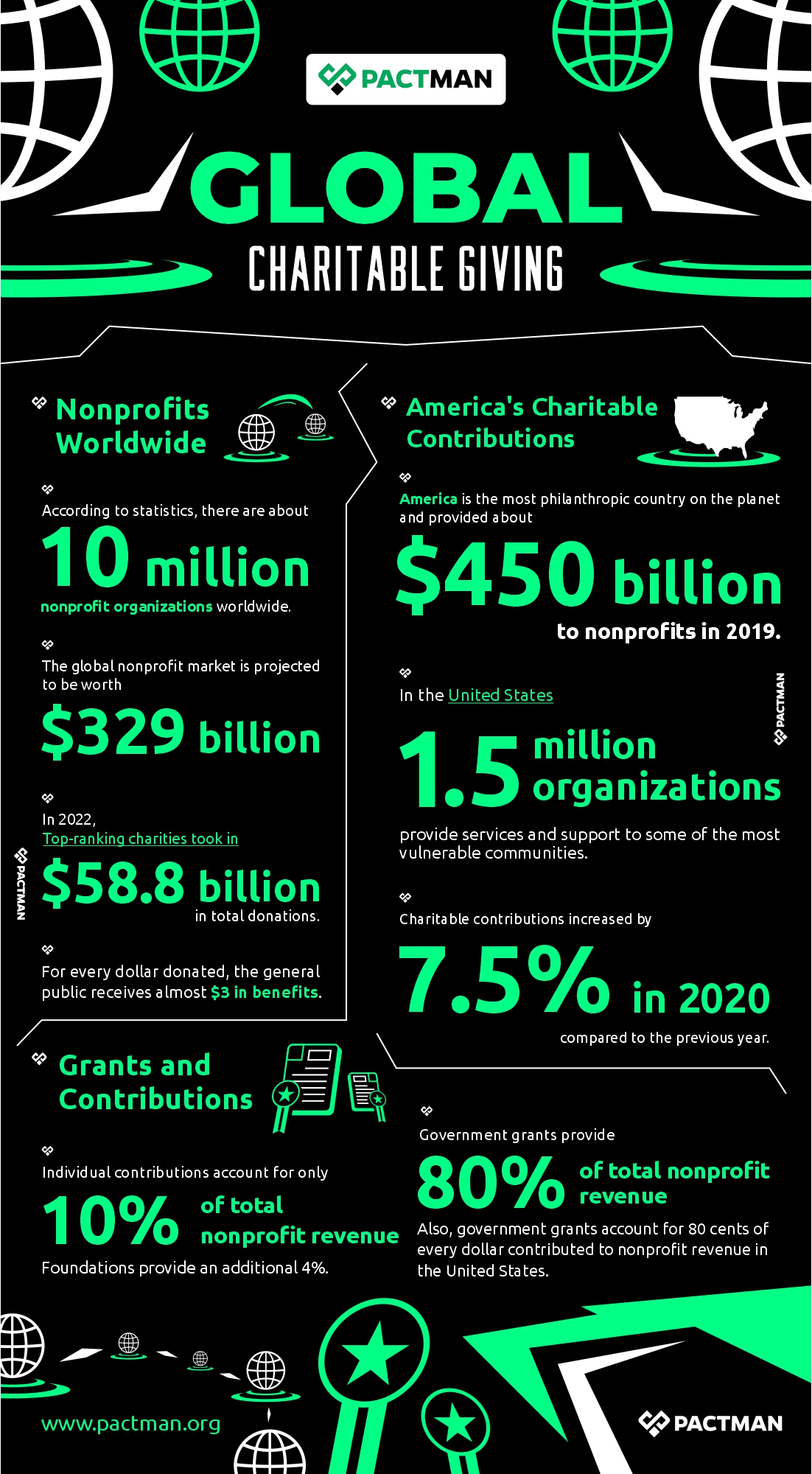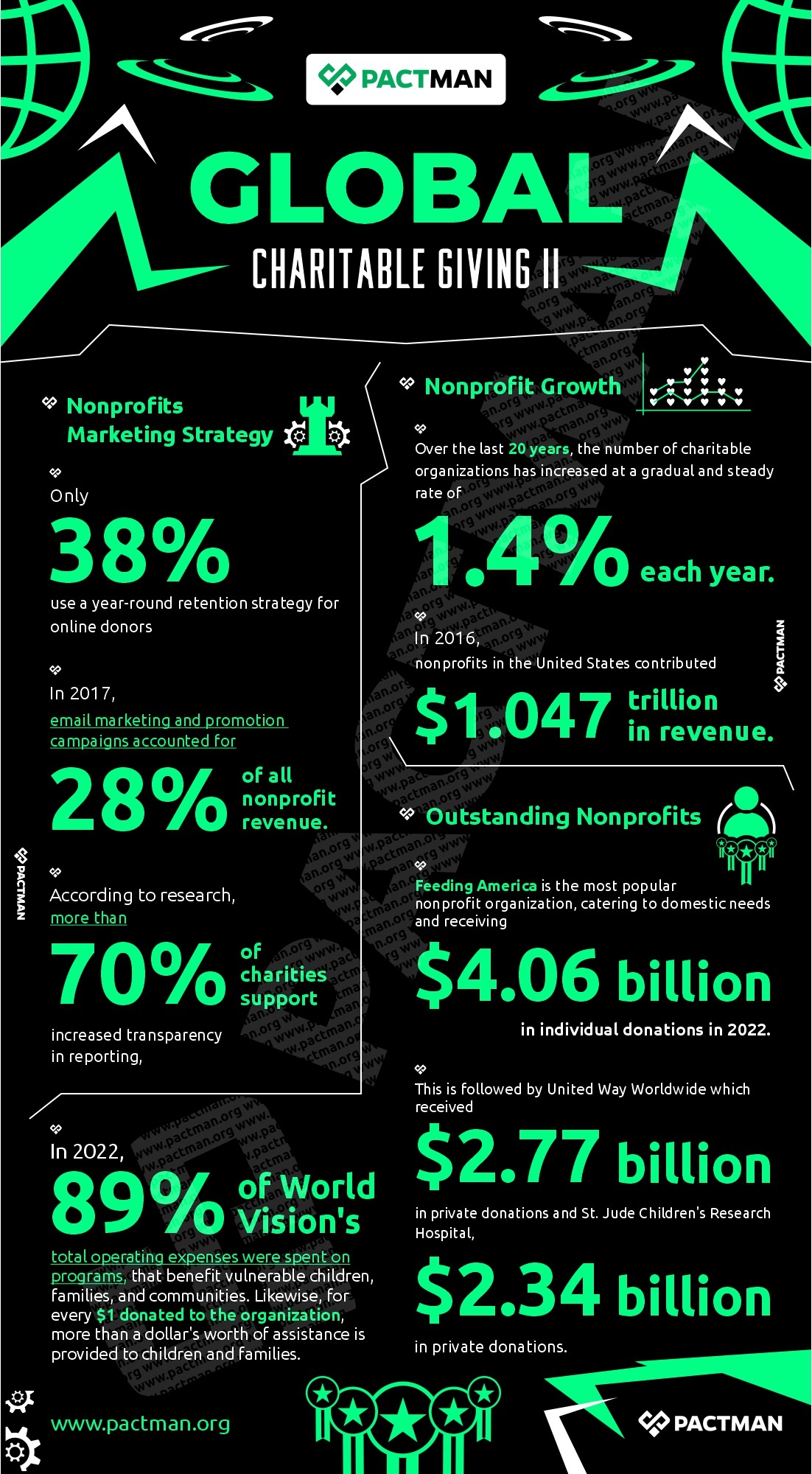I
Introduction
Charities invest a lot of time and effort in developing impactful initiatives. Also, the public, when seeking worthy charities to donate to, spends time looking for trustworthy charities/nonprofits. By and large, the assurance sought is to prove that these charities are truly acting charitably while also carrying out their charitable purposes.

When nonprofits choose to uphold and maintain these standards of public trust and meet growing needs of their communities, they are perceived as valuable and worthy of public support.
The nonprofit sector is considered an effective tool and channel for reaching and addressing human needs and also doing good. Hence, their impact is significant to the government, the economy, and society. Likewise, charities have the opportunity, and perhaps even the responsibility, to bridge the gaps within society.
II
Why is it Important to Donate to Charities?
Nonprofit organizations are critical to the well-being of our society, communities, and families. In the United States, 1.5 million organizations provide services and support to some of the most vulnerable communities. While some government services are accessible, most are overburdened and unable to adequately serve the needs of individuals. However, these philanthropic groups fill the voids created by governments.

Likewise, donations from the community and donors help to keep these organizations running. By and large, for every dollar donated, the general public receives almost $3 in benefits.
Far beyond the initial gain, charitable giving produces a “ripple effect” that affects local economies across the United States. Nonprofit organizations create jobs, empower clients, and teach useful skills to improve the overall quality of life of people and society.
III
Notable Statistics on the Charitable Sector
In this section, we will consider critical statistics within the nonprofit sector as well as their impact.

a. Nonprofits Worldwide
According to statistics, there are about 10 million nonprofit organizations worldwide. The global nonprofit market is projected to be worth $329 billion. In 2022, top-ranking charities took in $58.8 billion in total donations.
b. America’s charitable contributions
America is the most philanthropic country on the planet and provided about $450 billion to nonprofits in 2019. Despite a global pandemic and a continuing economic crisis, Americans continue to donate to nonprofit organizations around the world. Also, charitable contributions increased by 7.5% in 2020 compared to the previous year.
c. Grants and contributions
Individual contributions account for only 10% of total nonprofit revenue. Foundations provide an additional 4%.
On the other hand, Government grants provide 80% of total nonprofit revenue. Also, government grants account for 80 cents of every dollar contributed to nonprofit revenue in the United States.
d. Nonprofit marketing strategy
Only 38% of NGOs use a year-round retention strategy for online donors. In 2017, email marketing and promotion campaigns accounted for 28% of all nonprofit revenue.

e. Nonprofit Growth
Over the last 20 years, the number of charitable organizations has increased at a gradual and steady rate of 1.4% each year. Although a good rate, it pales in comparison to the growth in total nonprofit revenue. However, in 2016, nonprofits in the United States contributed $1.047 trillion in revenue.
f. Outstanding Nonprofits
Feeding America is the most popular nonprofit organization, catering to domestic needs and receiving $4.06 billion in individual donations in 2022. This is followed by United Way Worldwide which received $2.77 billion in private donations and St. Jude Children’s Research Hospital, $2.34 billion in private donations.
IV
Why should charities measure impact?
Organizations that seek to stand out among worthy charities to donate to must be willing to measure the impact of their charity initiatives. Likewise, the impact of a charity is a measure of how well it implements its strategy and advances its objectives. Effective governance requires demonstrating impact.

Oftentimes, charity organizations are compelled to measure impact solely to appease funders. This could be based on the notion that the initiative would attract more donors or funds. Hence, charities see impact measurement as something they must do to keep their current donors happy.
However, organizations that invest in impact measurement often discover that while they may not receive more financing, they gain other substantial benefits. One of such is improved service.
A little more than a third of nonprofits have one person or team in charge of measuring impact which shows a poor performance within the sector. However, according to conventional knowledge, focusing responsibility for a specific area or group of tasks will boost an organization’s effectiveness in that area.
Also, one prerequisite when measuring impact is to measure outcomes. Assessing impact entails having a good understanding of the outcome of a charity initiative and the changes that it brings about for the people they assist. Although charities may struggle to ascertain their impact, nevertheless, they must assess their work to show supporters, funders, and beneficiaries what they are accomplishing. It also helps organizations to make the needed improvements in areas that are found wanting.
V
Why should donors measure impact?
Assessing the impact of a donation is crucial for donors when seeking worthy charities to donate to. Firstly, it allows them to determine whether their funds were successfully employed by the charity and what difference their support made. Also, it allows them to decide whether to continue to finance the organization. Lastly, understanding impact can help donors stay engaged and passionate about their donations.

By and large, donors wield enormous power in establishing and guiding an organization’s approach to Impact Measurement. Also, donors are the most crucial factors for measuring impact, either by demanding it or as a reward for their support. They supply the necessary resources and can eliminate the most common perceived barrier to creating impact measurement: a lack of cash.
Donors ought to know whether their contributions were appropriately used and what impact they had. Not to mention, they may wish to use this data to explain their impact, discuss lessons learned from their efforts, or review their approach or strategy. Some of these factors will apply to certain types of donors more than others. For example, a corporate contributor may prioritize communicating impact, whereas an individual may prioritize understanding whether their overall objectives are satisfied.
A donor should also be confident to know that a charity is reviewing its impacts and using them to inform future work. Furthermore, charities should assess the impact of their work to determine how well they are meeting the needs of the people they seek to assist. They should also use the data to improve their activities based on evidence. In addition, charities can use data to communicate the impact of their work to stakeholders, to drive the best use of resources, and to share insights about lessons learned with other funders and charities.
Improving impact measurement across charity organizations
Too many organizations still do not use impact measurement to learn and enhance their services. Hence, to address the underutilization of measurement data in service improvement, donors should ask charities to report on how they use their impact metrics to improve their services. By and large, donors can help foster a learning and progress culture. They can also encourage sharing among charities by convening similar organizations and developing shared approaches to impact measurement.
According to research, more than 70% of charities support increased transparency in reporting, yet it is difficult for charities to execute on their own for fear of being penalized for reporting poor outcomes. Nevertheless, charities should be informed that donors may be tempted to fund only “what works” in the short term. Hence, donors should encourage transparency in reporting.
Donors are powerful tools in helping charity organizations accomplish their missions by fostering a culture and practice of open reporting.
VI
How can donors keep track of a grant?
There are several ways to analyze the impact of a grant. This can depend on the size of the donation, the organization’s size, and what the donor intends to do with the information.

The organization must keep meticulous track of the milestones agreed upon with donors. These ought to be agreed upon at the beginning of a grant and should be reasonable and attainable. They often include goals related to the charity’s outcomes and outputs (such as training 100 young entrepreneurs to learn special skills). Outcomes could be ‘increasing the literacy levels of at least 80% of the youths on the project.’
Milestones can also involve organizational objectives such as improving funds or the management team.
The donor can choose to hire a third-party service to oversee the grants.
A few important questions that donors can ask the charity organization with which they have supported include:
- How was the money spent?
- How impactful was the funding and how did it compare to expectations?
- What were the most important internal and external factors that impacted the success of the project?
- Were there any takeaways from the funded project? Will this have an impact on future work?
- What are the organization’s plans for the next 12 months and beyond?
- How else can I (the donor) assist the organization (for example, by donating time, knowledge, networks, or various kinds of funding)?
To sum up, measuring the true impact of a charity initiative will enable organizations to present the most accurate results to funders and stakeholders. Also, knowing the genuine impact of an initiative will assist charities in understanding the dangers of failure and the advantages of success in the future.
VII
What are the types of evidence that charities can use to measure impact?
Charities can utilize a variety of evidence to demonstrate the impact of their work. Anecdotal evidence and user experiences are some of the major tools to measure the impacts of donations. However, donors are increasingly requesting evaluation or performance data. This may include a defined ‘theory of change’. The charity can map how its day-to-day activities contribute to its broader mission. Theory of change comprises activities before and after project data, qualitative evidence, and statistical evaluations.

Although it is not commonplace for charities to lack documented evidence of impact; nevertheless, this does not imply that a particular program or initiative is unsuccessful. This is especially true for philanthropic giving, which frequently seeks to promote new and innovative work that, by definition, lacks an established evidence base.
VIII
Worthy Charities to Donate to Globally
With the many crises happening across the globe, both acute and simmering, one simple humanitarian approach that can have a significant impact worldwide is seeking worthy charities to donate to. In this section, we will consider some of the most impactful international charities that stand out for their transparency and good works.

1. World Vision
World Vision is a Christian-focused international charity organization with a global reach. By and large, the organization works with children, families, and communities. Essentially, the goal is to assist vulnerable individuals in fulfilling their full potential by addressing the root causes of poverty and inequality.
In 2022, 89% of World Vision’s total operating expenses were spent on programs that benefit vulnerable children, families, and communities. Likewise, for every $1 donated to the organization, more than a dollar’s worth of assistance is provided to children and families. World Vision continues to seek effective ways to reduce overhead.
Also, by collaborating with children and their families, the nonprofit can determine the most critical areas of need and seek effective ways to address these issues. World Vision operates in over 100 countries and does not discriminate based on religion, race, gender, or ethnicity.
The World Vision Gift Catalog allows users to donate to the organization and select presents such as providing clean water to a poor town or providing a goat to a needy family. Hence, donors can donate and designate how they want their money spent.
World Vision for over 70 years has been at the forefront of empowering communities in discovering impactful methods to better their lives and long-term solutions to their various problems. Donors seeking worthy charities to donate to can consider this outstanding organization.
2. Water for People
Water For People is a global NGO that operates in Latin American, Asian, and African nations to address the global water problem. The organization works to provide communities with long-term access to clean water and sanitation services. The nonprofit seeks to create a world where everyone has access to safe drinking water for the rest of their lives.
To achieve its goals “Water for People” works with local governments, businesses, and individuals to help them deliver clean water and sanitation systems to their communities. In addition, the organization helps to ensure that the communities have the resources necessary to sustain those systems today and in the future.
Overall, “Water for People” has assisted millions of people in nine countries in gaining access to safe drinking water, sanitation solutions, and hygiene education. The organization provides long-term water and sanitation services by building connections and capacities among governments, corporate enterprises, public utilities, and citizens.
“Water for People” stands out for addressing one of the major needs of humanity positioning itself as one of the most impactful charities to donate to.
3. World Medical Relief
World Medical Relief seeks to help individuals in need by distributing excess medical supplies. Hence, the organization’s programs prioritize local, national, and worldwide issues. Likewise, World Medical Relief allocates goods to areas of need regardless of race, color, gender, religion, nationality, or political opinions.
For over 70 years, World Medical Relief has maintained its international mission of assisting individuals in underdeveloped nations with medical and pharmaceutical needs. Founded in 1953 to assist the world’s medically disadvantaged, this multinational nonprofit delivers medical, dental, and laboratory supplies to communities in need. Primarily, the group relies on surplus materials and monetary donations to make an impact both worldwide and locally.
Individuals and donors who are passionate about supporting health issues can consider this impactful nonprofit. World Medical Relief is known for its sustainable impact and stands out as one of the most worthy charities to donate to.
4. Church World Service (CWS)
CWS prioritizes a singular goal: to create a world where there is enough for everyone. The organization seeks to establish a world where everyone has access to food, a voice, and a safe place to live.
For more than 75 years, CWS has been working to make its vision a reality as the organization believes that it is achievable. Over the years, CWS has welcomed thousands of refugees and other new neighbors into its communities. Likewise, the organization has assisted countless families in need and empowered the voices of those who have been silenced.
Church World Service was founded in the aftermath of World War II’s devastation. By and large, seventeen Christian faiths joined forces “to do in partnership what none of us could hope to do as well alone.” More than 11 million pounds of food, clothes, and medical supplies were organized by the CWS family during the early days of war-torn Europe and Asia.
Afterward, the organization began to welcome refugees seeking to start new lives in safety in the United States. Over the first ten years, CWS resettled more than 100,000 refugees. The organization’s programs continue to expand and evolve with time while also embracing collaboration and hospitality. CWS remains one of the most outstanding charities to donate to globally.
5. Habitat for Humanity
Habitat for Humanity strives to provide individuals in the world’s poorest areas with the tools they need to solve housing problems. The nonprofit seeks to give the necessary assistance so that everyone can have a place to call home. As a result, the group works hard to find effective ways to make cheap housing available.
Additionally, “Habitat for Humanity” works with local communities to identify accessible housing alternatives as housing needs tend to vary by area. Further housing assistance by the organization includes construction, maintenance, and home renovations. To achieve this, future homeowners collaborate with volunteers while paying a low-interest mortgage.
Also, “Habitat for Humanity” works to make buildings more energy efficient, provides water and sanitation solutions, handles disaster challenges, and provides housing loans. The group encourages local, national, and international governments, and intergovernmental forums, to prioritize housing and other housing-related concerns.
Donors seeking worthy charities to donate to can consider “Habitat for Humanity”.
All of the organizations outlined in this section are considered household names for good reason. Essentially, they are enormous and global, with large budgets and net assets. Regardless, they continue to implement excellent work both at home and abroad while keeping top-notch financial management and transparency standards.
Conclusion
To sum up, it goes without saying that quantifiable social impact is central to the charity sector. Not to mention, the sector’s primary goal is to provide public benefit, enhance people’s lives, develop communities, and impact society for the better. One great way to contribute to societal development is by seeking worthy charities to donate to.
By and large, charities are uniquely positioned to address societal concerns, such as rising social and racial inequalities. Also, charities have the capacity to overcome divides and unify people via their work. Hence, there is a need to recognize and respect philanthropic efforts regardless of where and to whom they are aimed. Our support to the sector enables Charities/Nonprofits to execute their mission, reach their potential and alleviate the innumerable problems that mankind faces.



One Response